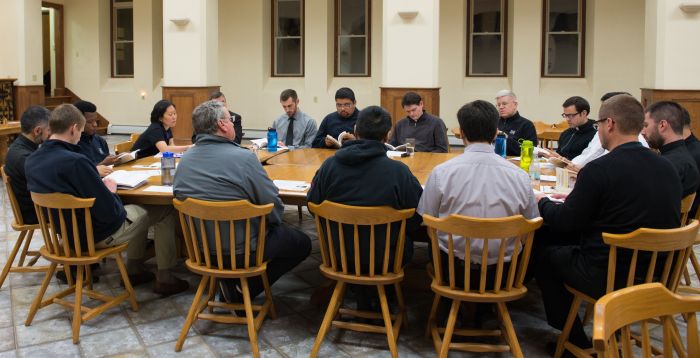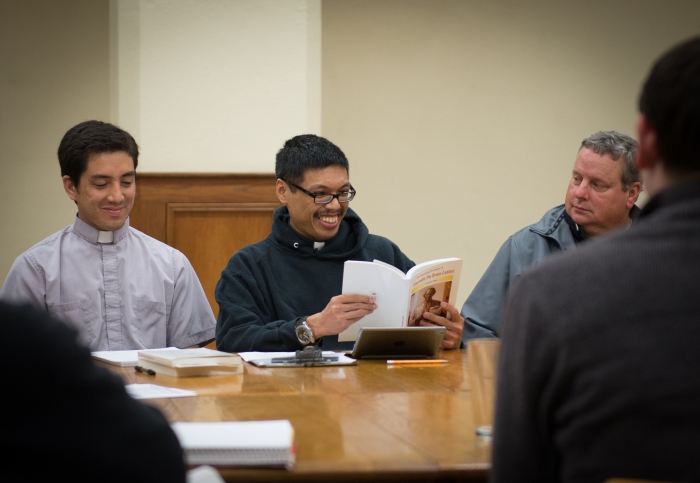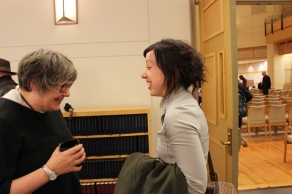
Call both one’s efforts at being a good person and the ways of thinking, feeling, and responding to circumstances that develop while one works to be a good person ‘virtue.’ Let a ‘meaningful’ life be a life imbued with a sense of purpose or significance—a life that is full, engaging, and engaged, where the fullness comes of something more than mere subjective interest and enthusiasm. It can seem as though virtue and meaning have very little to do with each other. Whatever sort of struggle might be involved in working to be a good human being can seem like something personal—an individual quest to have a beautiful character or a shining soul. Having a meaningful life, on the other hand, looks like the sort of thing that will require that I go beyond the business of working toward having a lovely soul and into a larger world where I try to find things that are genuinely worth pursuing, and devote myself to their pursuit. In this talk, I will work to bring the two together, partly by urging a different account of virtue, partly by developing a slightly more articulate account of meaning in human life, and always by drawing on work by Thomas Aquinas.
Learning to be Good
It may be that talk about virtue has never been common in ordinary life. It may be that the only common talk about virtue in North America happened a long time ago and was primarily concerned with women and their sexual habits, where ‘virtue’ was a matter of chastity. But in the latter part of the 20th century, Anglophone philosophers started talking about virtue again, and we now confront a wide variety of different kinds of talk about virtue in both moral philosophy and areas of empirical social science directed to exploration of moral psychology and moral education. By most of these lights, a specific virtue is a character trait that tends to make its bearer a better person than she would be without it, and the sorts of virtues that are topics of inquiry are acquired virtues—virtues that develop through training and practice. There are accounts of virtue that find their philosophical ancestor in the 18th century Scottish philosopher, David Hume. There are accounts of virtue that draw extensively from the work of Roman thinkers like Cicero. There are accounts of virtue rooted in work by the ancient Greek philosopher, Aristotle. The theorist of virtue I have found most useful is a scholastic neo-Aristotelian—Thomas Aquinas.
For Aquinas, there are four cardinal virtues—practical wisdom, justice, temperance, and courage. We need all four. Michael Pakaluk puts the point this way:
A virtue is a trait that…makes someone such that his activity—what he does, what he is responsible for—is reasonable. But there are four basic types of such activity: his thinking itself, as practical and directed at action; his actions ordinarily so-called…; and how he is affected. This last category splits into two, Aquinas thinks, on the grounds that acting reasonably in the realm of the passions involves regulating both the passions by which we are drawn to something and the passions by which we are repulsed from something. These two sorts of passions imply two sorts of tasks or achievements…which the ordinary distinction between the virtues of temperance and courage confirms (ST I-2.61.2 resp.).
I am happy to go into detail about the work of the virtues with you in discussion, if you like. For now, the point is just that the virtues foster coordination and cooperation among our various powers in such a way that we can pursue human good, and avoid what is bad for us, smoothly and well. And for Aquinas, even a fully virtuous person is likely to make mistakes in trying to act well.
Secondary virtues—generosity, for instance, or humility, or gratitude or kindness—work to strengthen and support the operation of cardinal virtues. Cultivating virtues is part of sound moral development. And sound moral development is crucial to human life, on this view. Unlike nonhuman animals, humans need more than just a combination of good fortune, instinct and training to lead good lives. We need developed characters.
Some contemporary neo-Aristotelians (and some more venerable theorists) think that acquired virtue is all that we need to lead a good human life. They think that living virtuously is enough to make us happy, and that, since virtue is its own reward, living virtuously ought to be enough to make our lives full and meaningful as well. For those who think that virtue is all that we need, what virtue does, for the most part, is make each of us a stronger and better person. This will give the virtuous person a measure of resilience when things do not go her way. It will help guide her when exercising virtue looks to put her at a tremendous disadvantage—as it will, for instance, if she called upon to deliver truthful testimony in court condemning a mob boss, or if she is called upon to care for an infirm parent who is demanding, ungrateful, and generally unkind, or if being mindful of the needs of her children and spouse requires turning down a very shiny job offer in a distant place. Virtuous activity can put the virtuous person at risk of death, misery, or serious personal disappointment. And, in general, one would have to be appallingly lacking in imagination to be incapable of thinking of anything more exciting to do than pay debts, help those in need, or work hard not to lie, cheat, abandon others, or steal when bad acts offer big rewards.
Aquinas knows that virtuous action can put the virtuous person at a disadvantage, as far as worldly success is concerned. He does not think that having developed a good character will, all on its own, make everything go well for the virtuous person. But his understanding of virtue has two features that are uncommon in other accounts of virtue, both of which give virtue a proper place in a meaningful life.
First, any specific virtue is directed to the common good, for Aquinas. Although he shares the general Aristotelian conviction that my virtues, if I have any, are good for me, the benefit that I get from my own good character is not the most interesting thing about my virtues for Aquinas. What my virtues do is direct me to good larger than just my own welfare and the welfare of those in my inner circle. Although what Aquinas means by saying that virtue is directed to common good, in the first instance, is not exactly what a contemporary Anglophone philosopher would generally mean by invoking common good, Aquinas’s understanding is not opposed to what we would mean either. It is just that the common good of interest to Aquinas operates on a cosmic scale. One could, for example, develop an interesting form of environmental ethics by meditating on Aquinas’s thought about common good. The commonality at issue reaches out toward the whole of creation. The human community is, of course, part of creation.
Second, and relatedly, Aquinas does not think that happiness and a sense of meaning in this life are the highest objects of aspiration for us. The highest object of aspiration is eternal happiness in a resurrected life. We cannot get that for ourselves without God’s help, but, in a strong sense, it is what we are made for, and virtue in this life supports us in our efforts to be right with ourselves, right with our fellow creatures, and right with God.
So much for a very quick introduction to virtue. What place do our efforts at moral self-improvement have in meaningful lives?
Meaning in Human Life
Questions about what makes life meaningful are relatively new questions in European philosophy. It looks as though the topic started to rise up explicitly for European thinkers in the wake of what was called “The Great War,” and again, with different urgency, in the wake of their Second World War, partly in response to the utter destructiveness of these ventures and pointedly in response to the way that neighbors turned on neighbors during efforts to annihilate Jewish people, gypsies, people with leftist political views, homosexual people, disabled people, and, in a different way, Slavic peoples, and to enslave many other peoples by the axis powers. In mainstream English-language philosophy, the topic did not get much currency until late in the twentieth century, and is only beginning to have spark more interest now. Part of the reason that mainstream Anglophone philosophers are reluctant to wade into questions about meaning in life is that there is no single, clear, precise characterization of what counts as meaning in this area.
There are desiderata—conditions that any adequate account of meaning in human life ought to meet if the view is to be a view about the sort of thing that despairing people find elusive and people leading significant or meaningful lives have. Anglophone philosophers being the kinds of intellectuals that they are, every one of the points I am about to list as reasonable starting points for thought about what makes life meaningful has been contested by at least one of the people taking up the question in the last thirty years. I will, for all that, move forward boldly rather than allowing us to be caught in the details of the disputations. Again, I am happy to trace the disputations for any of them if you like. Here are what I take to be reasonable starting points for thought about what makes life meaningful:
- Meaning in human life is not merely a matter of subjective satisfaction with how things are going—people with tremendous hardship and burden can be leading tremendously meaningful lives even when they do not expect that their efforts in any of their areas of activity will succeed.
- Meaning in human life has an important objective dimension—I can take it that my life has not been worth living and be wrong (one can think of this as one aspect of an ‘It’s A Wonderful Life’ principle); by the same token, I can take it that my life is filled with meaning and be wrong.
- Related to (1) and (2), to whatever extent assessments of happiness in life are importantly subjective, happiness is distinct from meaningfulness.
- Whatever kinds of activities, relationships, ways of living, or experiences contribute to meaning in human life, meaningful lives are better than meaningless lives—that is, ‘meaning’ is not a purely descriptive term in this setting.
- Related to (4), there is an important distinction between meaning in life and moral status (however moral status is assessed)—full lives, empty lives, and lives that are neither especially full nor especially empty have moral status.
There are various ways to carve the territory of recent Anglophone philosophical work on the meaning of life. One clear line of distinction demarcates naturalist views from supernaturalist views.
Supernaturalist views hold that our relations to, and participation in a spiritual order is crucial to having a meaningful life. Such views, notice, might be true even if there is no such thing as the variety of spiritual order postulated by the relevant supernaturalist theorist of meaning. If there is no such order, then our lives are not lives that can be meaningful, by these lights. Some supernaturalist views are distinctively theistic—ordinarily, these are monotheistic views focused on our relation to God. Other supernaturalist views find a spiritual order in the natural world, sometimes linked to pantheistic or polytheistic understandings of that order. These latter varieties of supernaturalism have not been explored extensively in the Anglophone philosophical literature. The philosophers have stuck with monotheism, for the most part. There tend to be three important dimensions to monotheistic supernaturalist views about the meaning of life:
- Metaphysical dimension: God’s existence is necessary to ground meaningful lives because an infinite, essentially good, almighty creator and legislator God anchors objective value generally, and the objective value of human life as part of this.
- Relational dimension: A meaningful life is informed by sound (if necessarily incomplete) understanding of God and involved in practical engagements that bring individual human beings into right relations with God.
- Ethical dimension: It is not possible to be in right relations with God unless one is also in right relations with others.
Naturalist views, on the other hand, hold that there is no supernatural, distinctively spiritual order, but that this is no hindrance to thinking about what makes life meaningful. On such views, I could find meaning in life through pursuit of truth or justice, or by understanding my life as made possible by the struggles of people who came before me, hoping to carry good forward to those who will come after me.
This is the territory in which contemporary Anglophone philosophical exploration about questions of the meaning of life hangs out. Within each of the categories, there are many divergent views, and, by most philosophers’ lights, no one strand of thought on the topic is entirely fully developed at this point. There is, however, a common thread that runs through all the work, as near as I can tell, a thread that takes some of its coloring from the usual ways of distinguishing questions about meaning from questions about happiness. It goes like this—in virtually all contemporary work (except work committed to thoroughly subjectivist naturalism), meaningful lives are meaningful in part because those leading meaningful lives operate with an understanding of their lives as participating in a good larger than their own welfare or advantage and the welfare or advantage of those they regard as members of their intimate circle. What sort of “larger” is involved in this larger good? Thaddeus Metz offers the following proposal:
[T]he concept of meaning is the idea of connecting with intrinsic value beyond one’s animal self. The animal self is constituted by those capacities that we share with (lower) animals, i.e., those not exercising reason. These include the fact of being alive, the instantiation of a healthy body, and the experience of pleasures. These internal conditions may well be intrinsically valuable, but they do not seem to be the sorts of intrinsic value with which one must connect to acquire significance. To say that the concept of meaning is the idea of relating positively to intrinsic value beyond one’s animal self is to say that while merely staying alive or feeling pleasure logically cannot make one’s life meaningful, connecting with internal goods involving the use of reason, and with all sorts of external goods, can do so [“The Concept of a Meaningful Life,” in Joshua W. Seachris, editor, Exploring the Meaning of Life, (Oxford: Wiley-Blackwell, 2013), p. 88].
Perhaps more than any other Anglophone analytic philosopher working on questions about the meaning of life, Metz is immersed in the whole of the relevant contemporary literature. He covers the waterfront better than anyone else. And he is acutely aware of the points at which his treatment of the concept departs from some recent analytic work on the topic. For all that, one can complain about various features of Metz’s account of the concept of meaning from a Thomist point of view. Here are a few of them.
First, Metz’s way of distinguishing what we share with non-human animals from our distinctively human capacities diverges from Aquinas’s metaphysics of human nature. For Aquinas, we are the animals with intellect. Intellect is not the same was what contemporary philosophers mean by ‘reason.’ In an early work, Aquinas remarks on aspects of nonhuman animal apprehension and appetite that have something of reason in them:
It should be noted…that not only in the apprehensive powers but also in the appetitive there is something which belongs to the sensitive soul in accordance with its own nature and something else according as it has some slight participation in reason, coming into contact at its highest level of activity with reason at its lowest…. Thus the imaginative power belongs to the sensitive soul in accordance with its own nature, because forms received from sense are stored up in it, but the estimative power, by which an animal apprehends intentions not received by the senses, such as friendship or hostility, is in the sensitive soul according as it shares somewhat in reason…. The same principle is verified also in regard to the appetitive power. The fact that an animal seeks what is pleasurable to its senses (the business of the concupiscible power) is in accordance with the sensitive soul’s own nature; but that it should leave what is pleasurable and seek something for the sake of a victory which it wins with pain (the business of the irascible), this belongs to it according as it in some measure reaches up to the higher appetite [Disputed Questions on Truth, q. 25, a.2].
It is hard to separate the most complex operations of nonhuman animal apprehension and appetite from their simplest human counterparts. For all that, intellect sets humans apart from other animals on this view, and, among intellectual creatures, humans are further distinguished by having discursive reason—we are, as Aristotle might put it—the chatty animals. This is, for Aquinas, part of the way in which we are animals.
Second, not just any intrinsically valuable, discursively assessable goods will count as goods to which we can connect in a way that confers meaning on our lives. Active participation in a thriving human community, for example, will only count as lending significance and meaning to one’s life if that community is, itself, ordered to justice and guided by due concern for the common good. If we had to find a slot for Aquinas in the contemporary philosophical taxonomy, he will count as a supernaturalist for whom the metaphysical, relational, and ethical dimensions are all intertwined.
Finally, concern about virtue is kept at a distance in Metz’s treatment of meaning. If we wanted to ask Aquinas to speak to questions about meaning in human life, virtue would have a secure, central place in our discussion.
Putting Virtue in its Place—A Thomist Picture
How will a friend of Aquinas handle a question about the place of virtue in a meaningful life?
First off, a friend of Aquinas, if I understand those of us who are friends of Aquinas, will urge that a properly virtuous life will, insofar as it is virtuous, be a meaningful life. It may not be a happy life, on any ordinary understanding of happiness. I can be as wise, just, brave, and temperate as you please but face ethical circumstances so challenging and hostile that my good character makes me a target for abuse rather than an esteemed person. In this sense, a Thomist account will square with the first and third of the starting points for an account of meaning.
Second, the fact that even a person with a full complement of acquired virtues—a strong character—can make mistakes and will occasionally have good reason to regret her decisions and her actions squares with the objectivity constraint on claims to meaning in human life. I might throw myself into a cause, for example, after careful consideration and in good conscience only to find that the thing I fought for was not worth fighting for.
Third, because acquired virtue on Aquinas’s understanding is perfective of my nature as a human being, virtuous lives are better than vicious lives in a sense isomorphic with the sense in which meaningful lives are better than meaningless lives.
Perhaps most importantly, because acquired virtues are directed to common good in the first instance for Aquinas, a genuinely virtuous life will, by necessity, involve the right kinds of relations with intrinsically valuable internal and external goods to meet the kind of criterion for meaning sketched by Metz (echoing dominant trends in contemporary Anglophone philosophical work on the topic).
In this sense, pulling Aquinas into conversation with contemporary Anglophone philosophers on questions about meaningful lives gives through about virtue a central role in thought about meaning.
Candace Vogler is the David B. and Clara E. Stern Professor of Philosophy and Professor in the College at the University of Chicago, and Principal Investigator for Virtue, Happiness, and the Meaning of Life. Vogler gave this talk at Valparaiso University as part of their programming on the theme of the pan-humanities seminar taken by every freshman, and the theme this fall is “human meaning and purpose.” She was hosted by the Department of Philosophy at Valparaiso University.

 We’re thrilled to announce two honors for our co-principal investigator Candace Vogler.
We’re thrilled to announce two honors for our co-principal investigator Candace Vogler.












